Pollution Killed 9 Million People in 2015, New Study Finds
That's more than AIDS, tuberculosis, and malaria combined.

A new study has found that pollution is responsible for around 9 million premature deaths, or roughly the number of people in New York City on a workday, a year. And that’s a global statistic — the study’s review of 2015 found that pollution contributed to 16 percent of all deaths worldwide; or roughly one in six.
The shocking data, published Thursday by The Lancet’s Commission on pollution and health, was compiled over two years by researchers in over 130 countries, and drew on studies by organizations such as the World Heath Organization and the World Bank.
The study found that the dire effects of pollution are overwhelmingly killing the poor and marginalized; nearly 92 percent of pollution-related deaths are occurring in low-income and middle-income countries, with sub-saharan Africa experiencing the highest population-based estimates of premature death and disease.
Here are some ways to contextualize just how monumental the problem of pollution is, based on some factoids found in this study:
- Exposures to polluted water, soil and air are killing more people prematurely than any of the lifestyle choices we often associate with early deaths: such as high-sodium diets, obesity and alcohol.
- Pollution is causing three times as many deaths yearly as AIDS, tuberculosis, and malaria combined.
- While we spend a lot of headlines on global terrorism, pollution is kill 15 times as many deaths as war and all forms of violence.
- In the countries that are the most severely affected, the study concludes that pollution is responsible for more than one in four deaths.
Although household air and water pollution is slowly declining, the study found that air pollution is getting worse, and it’s due in a large part to industry:
Ambient air pollution, chemical pollution, and soil pollution — the forms of pollution produced by industry, mining, electricity generation, mechanized agriculture, and petroleum-powered vehicles — are all on the rise, with the most marked increases in rapidly developing and industrializing low-income and middle-income countries.
Air quality appears to also be the biggest killer, according to the study, with 6.5 million deaths in 2015 from issues like respiratory illnesses, heart disease, strokes and cancer.
The study maintains that it’s a myth that developing nations must put aside the environment in order to become more prosperous economically. Pollution is not just killing us, it’s also really expensive because it’s killing us.
According to the study, welfare losses globally due to the effects of pollution on humans are estimated to be around $4.6 trillion a year — that accounts for 6.2 percent of the world’s economic output. The study recommends that a combination of law and regulation, technology, and governmental enforcement can greatly contribute to curbing the world’s pollution crisis.
If there’s any silver lining, it’s that actively taking on global warning can merit results, and evidence of this is already being proven by first world countries.
“In the United States, investment in pollution control has returned $200 billion each year since 1980 ($6 trillion total),” the study notes. “The claim that pollution control stifles economic growth and that poor countries must pollute to grow is false.”